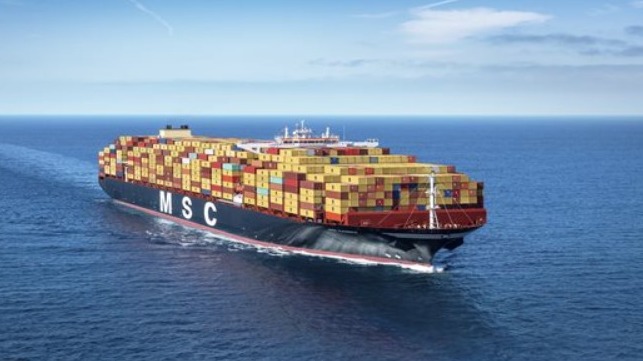MSC Estimates Pass Along Costs From Implementation of EU ETS

Mediterranean Shipping Company (MSC) has become the latest major carrier to advise customers of the potential financial costs that it expects to pass on related to the potential expansion of the European Union Emissions Trading System (EU ETS) to the shipping industry. The world’s largest container carrier acknowledged that the final terms are not resolved but decided to issue a customer advisory. Maersk had issued a briefing for customers on the potential cost if the EU proceeded with its plans.
“As other industries do today, MSC and other ship operators would purchase and surrender ETS emission allowances, or EU Allowances (EUAs), for each ton of CO2 emissions reported under the scope of the system,” MSC explains to customers on the potential impact. “Should the EU fully implement its plans, we anticipate higher operating costs in order to be compliant. We therefore plan to pass on the cost of compliance, as we have done with other forms of environmental regulatory costs in the past.”
MSC recognized that the legislative issues are yet to be resolved noting that the European Commission has proposed a phased-in approach for the shipping industry over the next four years, while the European Parliament has recommended 100 percent application from the start. The geographic scope is also to be resolved as is the price of the EUAs.
The customer advisory sets out costs ranging from a low of approximately $30 per dry FEU to a high of approximately $160. The average forecast for each dry FEU is $85. Similarly, the range for each reefer is between approximately $100 and nearly $500. The average for reefers is approximately $250. The model was developed based on an average EUA price of approximately $90 per ton of CO2 applied at 100 percent.
MSC says it continues to closely monitor developments on the proposal while advising customers of the potential costs and process it intends to follow. “MSC will make calculations beginning on the day the system is introduced by the EU and will review them monthly, based on a benchmark public index for EUA prices. Each trade, comprising a number of MSC services, will have its own charging structure for inbound and outbound cargo to compensate for the new costs from the need to acquire these allowances.”

that matters most
Get the latest maritime news delivered to your inbox daily.
Maersk also predicted that there would be significant added costs in shipping in a customer advisory issued in July 2022. Also using the assumed cost of $90 per ton of CO2, Maersk set the cost between approximately $100 and $200 based on distance and other factors for dry cargo. The impact on refers they estimated in a range between approximately $150 and $325.
With the rules due to come into effect at the beginning of 2023, both carriers and shippers are left to speculate on the final cost.
